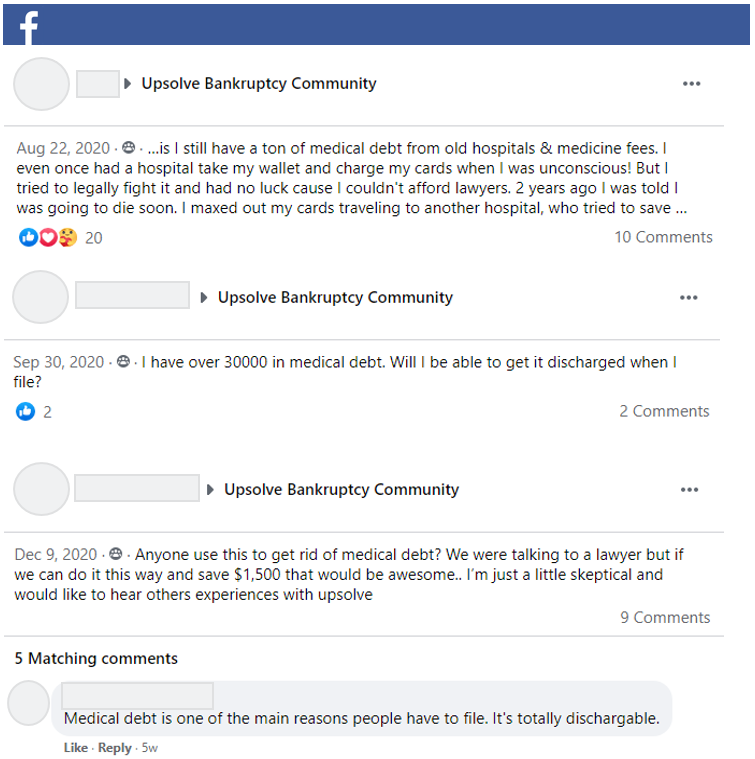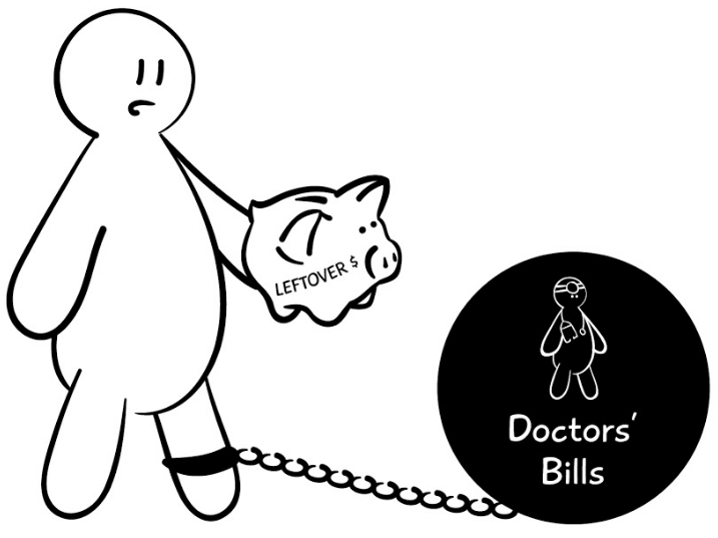Can I Get Rid of my Medical Bills in Bankruptcy?
4 minute read • Upsolve is a nonprofit that helps you get out of debt with education and free debt relief tools, like our bankruptcy filing tool. Think TurboTax for bankruptcy. Get free education, customer support, and community. Featured in Forbes 4x and funded by institutions like Harvard University so we'll never ask you for a credit card. Explore our free tool
Medical debt and loss of income for medical reasons plays a role in more than 60% of personal bankruptcy filings. If you’re struggling to make ends meet while dealing with medical bills, bankruptcy can provide relief.
Written by Attorney Andrea Wimmer.
Updated July 20, 2023
Medical bills are almost always unexpected. 39% of Americans don’t have the disposable income to pay for an unplanned emergency costing more than $400. Even when we’re not living through a pandemic, medical bills can pile up fast. If you’re drowning in medical debt, you may be asking if you can get rid of your medical bills by filing bankruptcy. We have good news...
You Can Eliminate Medical Debt Through Bankruptcy
Medical debt incurred before you file bankruptcy is eliminated when you receive your bankruptcy discharge.
That even includes any medical bills you don't get until after the bankruptcy case is filed. As long as the medical treatment happened before filing, the debt is dischargeable.
What Type of Debt Is Medical Debt?
In a bankruptcy case, all of your debts are put in one of three categories:
Secured debt: The type of debt is backed by property. The most common secured debts are car loans.
Unsecured debt: This type of debt is not connected to a specific piece of property. Unsecured debt includes credit card debt, personal loans, student loans, etc. Medical debt is unsecured debt.
Priority debt: Unsecured debt that gets special (priority) treatment under the Bankruptcy Code. Examples include tax debts, child support, and alimony.
Can You Lose Your Home Due to Medical Bills?
Because medical bills are unsecured debts, they’re not connected to any property at all. If payments aren’t made on a medical debt, all an unsecured creditor like a hospital can do is file a lawsuit. Typically, unsecured creditors collect on their judgment by doing a wage garnishment. But the judgment could attach to your real estate. It depends on state law whether a judgment can lead to a foreclosure.
What’s more common are foreclosures by mortgage companies after health issues cause someone to fall behind on their mortgage payments.
Upsolve Member Experiences
1,997+ Members OnlineHow Many Bankruptcies Are Due to Medical Bills?
This is a difficult question to answer because there are different ways medical bills can lead a person to file bankruptcy:
Cases where hospital bills make up most of the debt
Cases where the cost of medical care and lack of insurance coverage caused the filer to use credit cards to pay for other expenses
Cases where the filer used credit cards to pay for medical expenses not covered by their health insurance
In 2005, then-Harvard professor Elizabeth Warren published a paper concluding that more than 40% of personal bankruptcies are due to medical debt. This number was updated to more than 60% in 2009. [1]
Not all researchers agree with this number.
From experience, we can tell you that almost all low-income Americans who file bankruptcy have some sort of medical debt. Here’s just a small sampling of questions related to medical debts from our Facebook Community.

When Should I File Bankruptcy for Medical Bills?
That’s another hard question. Filing bankruptcy is not right for everyone or in every situation. Some factors to consider are
The amount of medical debt: Can you pay it off in a year with monthly payments?
Your total debt: Are you juggling multiple debt repayments every month?
The amount of money you earn: What type of bankruptcy can you file?
The exemptions you can claim to protect your property: Would you lose any property by filing bankruptcy?
A free credit counseling session can help you figure out whether bankruptcy is the best debt relief option for you.

What Happens to My Other Debts in a Medical Bankruptcy?
Bankruptcy law requires that all of your debt is listed in your bankruptcy forms. That’s why there’s no such thing as a true “medical bankruptcy.” Creditors are treated differently depending on the type of debt you owe and the type of bankruptcy you file.
What Are the Types of Bankruptcy?
Most people file Chapter 7 or Chapter 13 bankruptcy. Each type of bankruptcy takes into account the filer’s healthcare costs.
Chapter 7 bankruptcy
This is the most common type of bankruptcy. It’s sometimes called a “liquidation bankruptcy.” In Chapter 7, the filer agrees to give up certain unprotected property in exchange for a fresh start. Most people who file Chapter 7 bankruptcy are able to keep all of their belongings using bankruptcy exemptions.
Since Chapter 7 is only available to people who don’t make too much money and pass the means test, there’s no repayment plan. Instead, the bankruptcy discharge wipes out most debt in as little as 3–4 months.
Chapter 13 bankruptcy
Chapter 13 does involve a repayment plan and is often used to catch up on real estate loans and prevent a foreclosure. Filers make payments based on their monthly income and expenses in exchange for protection from creditors. Once the payment plan has been completed, the bankruptcy discharge wipes out all remaining debts.
Which type of personal bankruptcy is best for your situation depends on... well… your situation. To learn more, consider scheduling a free consultation with a bankruptcy attorney in your area.
Does Filing Bankruptcy Hurt My Credit?
Yes and no. It all depends on your situation. Consider the following common scenarios.
I’m Current on Everything and Have Great Credit!
In this case, filing bankruptcy will hurt your credit and credit score. The question you have to ask yourself is whether you can set up an affordable repayment plan for your medical debt. If not, you risk falling behind on other debts which also hurts your credit rating.
I Have a Hard Time Making Ends Meet Every Month.
If you’ve been living paycheck to paycheck before you had the medical debt, protecting your credit is about to become impossible. Filing Chapter 7 bankruptcy can jump-start your financial recovery by giving you a clean slate, even if you still have ok credit.
Especially if the amount of medical debt is much higher than your total debt, your credit report will suffer no matter what. While medical providers may not be as quick to submit information for your credit report, eventually they will. If you’re unable to pay your medical bills, this means they’ll start impacting your credit score sooner or later.
A bankruptcy will give you the chance to start rebuilding your credit rating.
Let’s Summarize…
You can get rid of medical bills in Chapter 7 and Chapter 13 bankruptcy. What type of bankruptcy is right for you (if any) depends on your financial situation as a whole. So, keep doing what you’re already doing and research your options.
If you’re worried about filing bankruptcy without professionAl help, schedule a free consultation with a local bankruptcy lawyer to get legal advice. If you can’t afford to hire a lawyer, you may be able to use Upsolve’s free web tool to file bankruptcy.
Either way, remember, you’re not alone and you can get through this.

If you’re struggling with medical bills check out this resource page from our friends at Triage Cancer. Even though their mission is specific to folks dealing with a cancer diagnosis, their content includes information that's helpful for anyone overwhelmed with medical expense.
Sources:
- American Journal of Public Health. (2020, March). Medical Bankruptcy: Still Common Despite the Affordable Care Act. 109, no. 3 . Retrieved October 1, 2020, from https://ajph.aphapublications.org/doi/10.2105/AJPH.2018.304901
